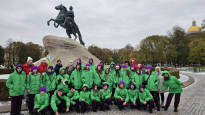We asked various experts how Finland could help Ukrainian children sent to Russification camps. According to Amnesty, Russia uses children as a weapon in war.
Fairy tale Helin,
Saana Uosukainen
Why can’t the children sent to the Russification camp just be taken away? Is anyone even trying to find out the fate of the children taken by Russia?
On Sunday, published pictures and videos from a brainwashing camp run by Russia, which operates in Terijoki near the eastern border of Finland.
We asked what Finland and the international community can do to help Ukrainian children taken by Russia. ‘s questions were answered, among others, by the Minister of Foreign Affairs Elina Valtonen (collect.).
1. How many children have fallen victim to forced migrations in Russia?
According to various estimates, Russia has taken a total of 20,000 children from Ukraine since the beginning of the war.
About 10,000 of them have been taken to Russification camps. In addition, Russia has taken children for forced adoption.
There is no precise information on the number or location of Ukrainian children in Russia.
2. Can Finland do something about it? One Russian Russia has established one of its units focused on brainwashing Ukrainian children very close to the Finnish border.
Located on the west side of the big city of St. Petersburg, the Terijoki camp center is only about one hundred kilometers from the Finnish border. Finland can do little to stop Russia’s abuses.
Finnish Foreign Minister Elina Valtonen said at a press conference on Monday that she considers Russia’s forced Russification to be “unbelievable and shocking”.
According to Valtonen, Finland is trying to prevent Russia’s activities as part of the international community, such as the European Security and Cooperation Organization OSCE and the EU. The goal is to hold representatives of the Russian administration accountable for war crimes.
The matter has hardly been brought up in the Finnish parliament.
3. Why can’t the children be taken out of Russia?
Picking up children is a difficult task.
Russia is not willing to cooperate, but its authorities are outright trying to prevent the investigation of the children’s situation, says the chairman of the OSCE General Assembly Pia Kauma (collect.).
It is difficult to even find out exactly how many children have been taken and what their whereabouts are. Collecting information from the Ukrainian side is made difficult by the fact that the situation in the occupied territories is chaotic. Cities have been bombed to the ground at worst.
In addition, Russia systematically disregards reports that, for example, the OSCE has published on the treatment of Ukrainian children.
Also a communications specialist at Amnesty International’s Finland department Iina Lindeman estimates that applying for children from Russia is practically impossible in the current situation.
4. What has been achieved so far?
The situation of Ukrainian children in the occupied territories and in Russia is investigated by various parties, from states to organizations and individuals. It’s slow though.
As a result of negotiations, Russia returned six children to Ukraine a week ago. The oil state of Qatar acted as mediator in the negotiations.
A few hundred of the children taken by Russia have been recovered.
At the OSCE meeting in the fall, the Netherlands proposed the establishment of a DNA system so that children and families could be identified even after a long time. This way the child could be found even if his appearance had changed over time or Russia had changed his name to another.
5. Is the fate of children of interest to the international community?
Interested, but attention is constantly elsewhere.
Different countries focus primarily on military support for Ukraine, and the situation of, for example, Ukrainian children taken by Russia does not receive as much weight.
According to Amnesty’s Lindeman, it is easy to disregard human rights during war when the focus is on military operations and dying soldiers.
According to the organization, Russia has directly turned children into a weapon when it forcibly tries to turn them into Russians.
6. Are Russia’s actions against Ukrainian children crimes?
It is uncertain whether Russia will ever be sued for the treatment of children. Several international bodies are investigating the matter and non-governmental organizations are collecting evidence of possible war crimes.
The International Criminal Court ICC has issued an arrest warrant for the Russian president About Vladimir Putin and the Children’s Commissioner From Maria Lvova-Belova because of forced relocations and adoptions of Ukrainian children.
According to a report published by the OSCE in the spring, Russia violates several different children’s rights with its activities.
According to Ukraine, the forced transfer of children is genocide and the Russification of children has the same characteristics, so it should also be called genocide.
Amnesty International emphasizes that during war or occupation, all parties to the conflict are bound by international humanitarian law and human rights. Even during the war, the child has the right to preserve his identity and receive education in his own language. Amnesty does not take a position on whether the treatment of Ukrainian children is a war crime or genocide.
The UN is investigating the forced migration of children and brainwashing as a possible war crime.
